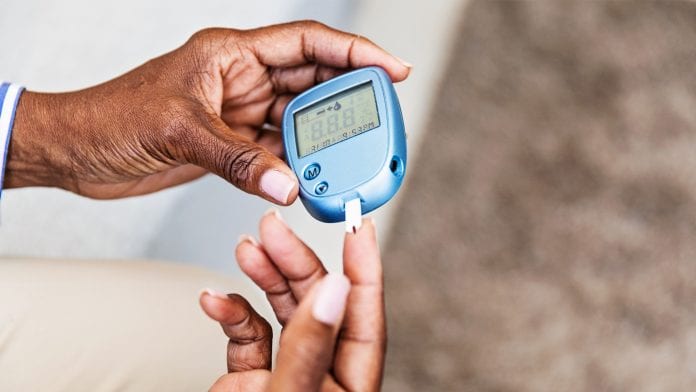
Experts from the Diabetes Research & Wellness Foundation explore issues around diabetes prevention and treatment.
There are currently 3.4 million people with Type 2 diabetes in England, with around 200,000 new diagnoses every year. While Type 1 diabetes cannot be prevented and is not linked to lifestyle, Type 2 diabetes is largely preventable through lifestyle changes (NHS England).
Diabetes Research & Wellness Foundation (DRWF) is a UK-wide charity set up in 1998 to raise awareness of all types of diabetes and associated complications, provide information and support to promote good self-management and to enhance quality of life.
While funding vital diabetes research to establish the causes, prevention, and treatment of Type 1 and Type 2 diabetes; develop improved management and treatment options; and ultimately find a cure, the DRWF aims to ensure that people have access to the right information and support to develop a proactive self-care approach to successful self-management, to ensure that they are ‘staying well until a cure is found’.
Professor Thozhukat Sathyapalan
Professor Sathyapalan (Sathya) is the Chair in Academic Diabetes, Endocrinology and Metabolism in Hull York Medical School, University of Hull and Honorary Consultant Endocrinologist at Hull and East Yorkshire Hospitals NHS Trust, UK.
What are the key challenges currently facing diabetes management and treatment?
1) How to improve diabetes management of people who did not receive optimal care during the COVID-19 pandemic
2) How to pick up complications of diabetes which were missed during the pandemic
3) We are using more and more digital consultation these days, so how to engage people who are not digitally savvy to avoid a digital divide
4) How to provide adequate psychological care for people with diabetes
5) How to improve engagement of people with diabetes for participating in research
What measures could be taken at a policy level to improve the treatment and care of patients with diabetes?
At a policy level, the integration of services including primary care and secondary care would improve holistic care. Plus, the improved provision of technology to provide virtual consultation in appropriate people and care nearer to home.
Is education of patients and/or healthcare providers an issue?
This is such an important area – DRWF works to help to provide more education for people with diabetes for good self-management; there are many resources available on the DRWF website and the charity administers the diabetes forum on HealthUnlocked, which is a peer-to-peer support group.
There is a need to provide more education for health care professionals on new technologies and medications for the management of diabetes.
Dr Mayank Patel
Dr Patel is a consultant at University Hospital Southampton; he has a keen interest in diabetes education and regularly teaches patients, patient groups, healthcare professionals and the wider public at health events. Dr Patel is a member of the DRWF editorial board and contributes to the Diabetes Wellness News – he is also the author of DRWF’s Managing diabetes when you are ill publication. He presents to people living with diabetes at our Diabetes Wellness Events, when we are able to hold events in person.
Are there preventive or protective lifestyle measures which patients can take to lower their risk of diabetes?
As always, the cornerstones for diabetes care are healthy eating, improving physical activity and positive behavioural changes. In terms of lowering risk in Type 2 diabetes, there is no specific one intervention – if there were, we would be sorted! Different things work for different people.
It is about starting with small changes to the diet and looking to increase physical activity where appropriate (for example, try to hit 10,000 steps per day); looking not only at weight management, but working with friends and family collectively and setting goals and priorities. Patients should not feel pressured to join the gym, but should aim to engage in regular ‘exercise’ (I now prefer the term physical activity) to the point where they break a sweat, are out of breath or become red in the face. It is important to take care with alcohol and to stop smoking, in order to help reduce the cardiovascular risk.
If a person is found to have pre-diabetes, GPs can refer people to the National Diabetes Prevention Programme. There is also a low-calorie diabetes remission diet, as developed by Professor Roy Taylor through the DiRECT study.
Dr Eleanor Kennedy
Dr Kennedy is DRWF’s Research Manager.
Has the COVID-19 pandemic had a significant impact on diabetes treatment and research?
Yes, and this is well documented elsewhere. Many of the people who have died or have become seriously unwell with COVID-19 have diabetes as an underlying chronic disease. There is now a vast amount of research going on into the pandemic and diabetes, most of which is being funded by the government.
Can COVID-19 trigger new cases of diabetes?
There is some evidence to suggest that COVID-19 infection can trigger a form of diabetes that is catalysed by direct damage to the pancreas.
Can you tell me about some of the research projects the DRWF has given its backing to?
The best place to learn about the research we have supported, such as the DRWF-funded Islet Cell Transplantation research at the Churchill Hospital in Oxford, is our website.
Diabetes Research & Wellness Foundation
www.drwf.org.uk
This article is from issue 18 of Health Europa. Click here to get your free subscription today.









